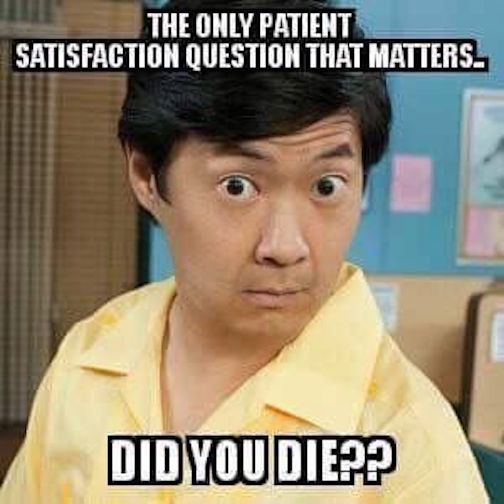Medical advice used to come from squirrelly sources. Not actual squirrels but just as nutty.
Today it comes from trusted men and women elected to high office.
And doctors.
Which brings up the element of trust.
Whose medical advice is better for people?
Would you rather take medical advice from a sweaty man with the sniffles and medical thoughts from a huge mouth that never closes, or someone trained in the medical arts at an accredited institution of higher learning.
That last part was a mouthful, but not too much for unaccredited bullshitters to slam with, “They don’t know everything.”
Medical professionals take a hit without doubts sewn by medical speculators. If you want the title of doctor in front of your name, go to medical school.
The National Barber Museum confirms that barbers of the Middle Ages, in addition to cutting and shaving hair, were often called upon to dress wounds and perform surgery. Called barber-surgeons, these knowledgeable men knew how to treat wounds and practiced other essential medical expertise. The Barber Surgeons Guild identifies the duties of these men as including bloodletting, dental extractions, surgery, and even amputations.
“What can I do for you today?”
“I’d like it long on top, tight on the sides, longer in back.”
“You’d like a mullet?”
“Yes, and my wisdom teeth need to come out, that lump on my leg could use a couple of leeches, and my finger turned black since I caught in my mink trap. I’d like you to cut it off.”
“No problem. We have a special this week: Two amputations for the price of one. It could be you or a family member.”
“I’ve got one for you, then. My uncle Frank just had his thirteenth child. That’s a member you could saw off.”
“Bring him in.”
Business Advice From A Doctor?
Why would a doctor certified to practice screw around with medial careers?
Let’s ask Kentucky’s finest, or second finest, Senator Rand Paul.
In 1999, he incorporated the National Board of Ophthalmology (NBO) to offer an alternative certification system, at a cost substantially lower than that of the ABO. Board members were Paul, his wife, and his father-in-law. His father-in-law, the board’s secretary, stated “I never did go to any meetings … There was really nothing involved. It was more just a title than anything else, for me”.
By Paul’s estimate, about 50 or 60 doctors were certified by the NBO. The NBO was not accepted as an accrediting entity by organizations such as the American Board of Medical Specialties, and its certification was considered invalid by many hospitals and insurance companies.
If that’s not specious enough, take a look at Senator Rand Paul’s haircut and you might wonder if he’s his own barber, too.
When Medical Advice Goes Wrong
Before I finished three rounds of chemotherapy and thirty-five jolts of radiation for HPV neck cancer, I saw doctors all the time.
This specialist, that specialist, and one more. It went from a general practitioner to an Ear Nose and Throat man to fine needle aspiration man, a chemo specialist, and radiation oncologist.
I gave them all an earful, because why not? We had time to talk. The first chemo guy was the most interesting.
I’d met him twice before.
The first time was after a check-up for my Parkinson’s afflicted father in law the medial profession had quit on. But not me.
The old man was a wreck from Parkinson’s and the meds he took to stabilize. He also had dementia so I spoke up for him as his caregiver.
Doctor ____ prescribed a round of chemo for his stomach ache. But he didn’t call it chemo.
Whatever he called it, the words came out in a voice similar to Daffy Duck, like an extra-large tongue in a medium sized head. And he was a funny guy to boot.
Before deciding whether or not to go with the chemo, we paused to reflect, and look up the diagnosis. It was described in the medical literature as a minor irritation in the stomach lining.
We declined the chemo and the old man lived on without the side effects. And he didn’t die of stomach cancer, either
The second time I met him, he wanted my mother in law to start chemo for her breast cancer. She declined and lived on as the most active senior I’ve ever seen.
She died at ninety and not from cancer.
Common Sense Medical Advice
I saw the twice rejected chemo oncologist on referral and thought, ‘This is the right guy for me.’ His voice was reassuring.
He said, “I will pwescribe three variethies of chemo along wifi a chemo-pump.”
This chemo-course made me wonder if he wasn’t getting even for my in-laws declining the chemo he’d lined up for them. I chalked it up to CN, Cancer Nerves.
In the pre-covid days of 2017 we sat in chairs facing each other from a foot away.
“Thiff will be a forough ewadication of cantha.”
I asked if he thought this course of treatment would have any effect on my voice.
He said it might, but that it probably wouldn’t be any worse than the speech defect I already had.
It was the first time I’d heard I had a speech defect.
“Oh, yeff your do. I cat ezaky pace it.”
Only because I don’t have a speech defect, I just grew up in North Bend.
“Well then, it all sounds like a go, all good, ready to start, hook me up right now and let’s kill the fuck out of this cancer.”
“Could you repeat that pease. Yo haud to untherthand wiff yo sthpee defet.”
We were looking eye to eye, no blinking, no smile, and I was slow-talking.
My thought was, ‘If he’s missing on my sudden speech defect, what else would he miss on?’
And that, Dear Readers, is why we get second opinions.
I asked the second guy about the difference in his single chemo approach and the other guy with three.
“A difference in philosophy,” he said.
I didn’t ask him about my speech defect and if I was hard to understand.



